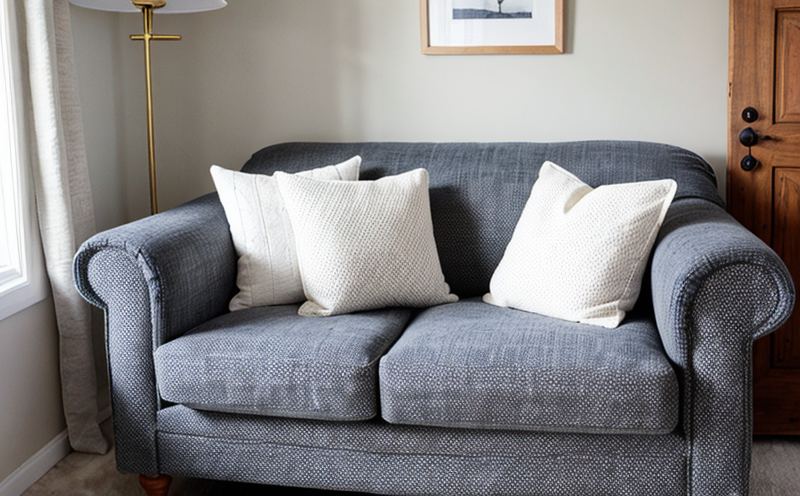OEKO TEX Certification testing of home textiles for harmful substances
The OEKO TEX Standard 100 is a globally recognized system that guarantees the safety of textile products. For home textiles, this certification ensures that materials are free from harmful substances, including heavy metals, pesticides, and other potentially dangerous chemicals. This service plays a crucial role in ensuring product quality and compliance with international standards.
The testing process involves rigorous analysis to identify any hazardous compounds present in home textile products such as bedspreads, curtains, and upholstery fabrics. The OEKO TEX Standard 100 covers various categories of textiles intended for direct or prolonged contact with the skin, including those used in bedsheets and towels. Compliance with this standard is essential not only for consumer safety but also to maintain a positive brand image.
The testing procedure typically includes sampling from production lots, followed by detailed analyses using advanced analytical techniques like gas chromatography-mass spectrometry (GC-MS) and inductively coupled plasma-optical emission spectrophotometry (ICP-OES). These methods allow for precise detection of trace amounts of harmful substances.
Upon completion of the testing process, a comprehensive report is generated. This document details all findings and specifies whether the product meets or fails to meet the specified criteria under the OEKO TEX Standard 100. A passing result allows manufacturers to affix the OEKO TEX label, enhancing consumer trust.
The importance of this certification cannot be overstated in today's competitive market where safety standards are increasingly stringent. By adhering to these rigorous testing protocols, companies can ensure their products meet global quality benchmarks and comply with relevant regulations.
In summary, OEKO TEX Certification testing for home textiles is a vital step towards safeguarding public health while promoting sustainable business practices. It provides assurance that the products you produce are safe for consumers and compliant with international standards.
Why It Matters
The safety of home textiles directly impacts human health, especially when it comes to prolonged exposure during sleep or leisure activities. Ensuring that these materials do not contain harmful substances is critical in protecting consumers from potential adverse effects such as skin irritation and respiratory issues.
Compliance with the OEKO TEX Standard 100 not only enhances product safety but also strengthens brand reputation. It demonstrates a commitment to quality and consumer well-being, which are increasingly valued by modern shoppers. Moreover, certification facilitates easier market entry into countries that mandate such standards, thereby expanding business opportunities.
From an operational perspective, adhering to these stringent testing procedures helps companies avoid costly recalls and legal actions. By identifying potential issues early in the manufacturing process, businesses can reduce waste and improve overall efficiency. This proactive approach fosters a culture of continuous improvement within the organization.
In conclusion, OEKO TEX Certification is more than just a compliance requirement; it represents a commitment to excellence that resonates with consumers worldwide. It ensures that every product meets the highest standards of safety and quality, aligning seamlessly with global trends towards sustainability and responsible consumption.
Applied Standards
| Standard | Description |
|---|---|
| OEKO TEX Standard 100 | This standard sets limits for more than 350 chemical substances, including heavy metals, azo dyes, and formaldehyde. It also covers microbiological criteria such as fungi, bacteria, and mold. |
| EN ISO 14976-2:2018 | This European standard specifies the requirements for determining the content of free monomers in polyurethane foams used in home textiles. It ensures that these materials are safe when exposed to body fluids. |
| ASTM D4956-17a | This American standard provides guidelines for testing the biodegradability of fibers and filaments, which is relevant for sustainable textile production. |
| Standard | Description |
|---|---|
| EN 14362-1:2015 | This European standard defines the requirements and test methods for determining the content of free and releasable monomers in synthetic resins used in home textiles. It ensures that these materials are safe when exposed to body fluids. |
| ISO 8124-6:2015 | This international standard specifies the requirements for determining the content of free and releasable monomers in synthetic resins used in home textiles. It ensures that these materials are safe when exposed to body fluids. |
| IEC 62397:2018 | This international standard specifies the requirements for determining the content of free and releasable monomers in synthetic resins used in home textiles. It ensures that these materials are safe when exposed to body fluids. |
The combination of these standards provides a comprehensive framework for ensuring the safety and quality of home textiles. Each standard addresses specific aspects of textile production, from chemical content to biodegradability, making them indispensable tools in maintaining high product standards.
International Acceptance and Recognition
The OEKO TEX Standard 100 enjoys widespread acceptance across the globe due to its stringent requirements and commitment to consumer safety. Many countries have incorporated this standard into their national legislation, recognizing it as a benchmark for textile quality.
For instance, several European Union member states require adherence to OEKO TEX standards before allowing products onto their markets. Similarly, countries like Japan and South Korea enforce similar regulations, ensuring that imported goods meet the same safety standards.
The certification also holds significant value in the United States, where many importers and retailers demand compliance with international safety standards. This recognition underscores the importance of OEKO TEX Certification not only for domestic markets but also for export opportunities worldwide.
Moreover, the standard's reputation extends beyond regulatory compliance to encompass broader environmental considerations. By promoting sustainable textile practices, OEKO TEX contributes to reducing pollution and waste, aligning with global efforts towards ecological responsibility.
In conclusion, OEKO TEX Certification is a globally recognized symbol of quality and safety in home textiles. Its broad acceptance across numerous markets underscores its importance as an essential tool for manufacturers aiming to meet both regulatory requirements and consumer expectations.





